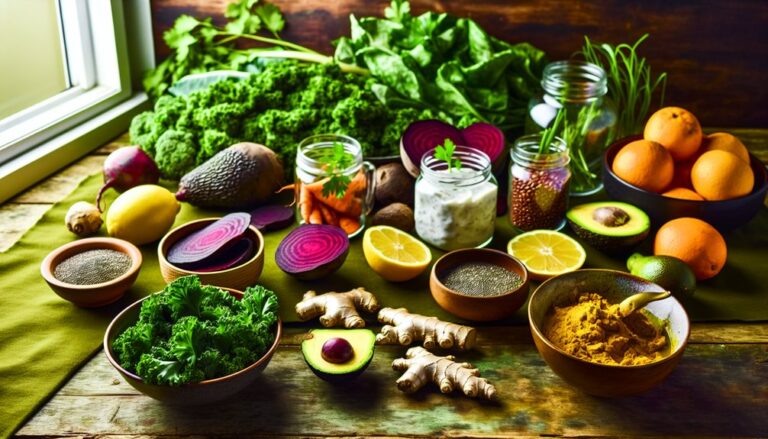

Healthy Living and Liver Detox: A Perfect Match
Balancing a healthy lifestyle with liver detox methods might seem contradictory, yet both can coexist harmoniously. You may think that extreme detox diets are the only way to support liver health, but subtle changes in your daily habits can be just as effective. By focusing on whole foods, regular exercise, and adequate hydration, you can enhance your liver’s natural abilities without resorting to quick fixes. So, how do you integrate these elements into your routine while avoiding common misconceptions about detoxing?
Understanding Liver Function
The liver plays a crucial role in your body’s overall health, acting as a powerhouse for detoxification and metabolism. This organ, shaped like a wedge, is divided into two main lobes, each made up of smaller units called lobules. Within these lobules, specialized cells called hepatocytes perform critical tasks.
One of the liver’s primary functions is detoxification. It filters toxins from your bloodstream, converting harmful substances into less harmful compounds that can be excreted. The liver also metabolizes alcohol and drugs, breaking them down to prevent accumulation in your system. Additionally, it regulates blood sugar levels by storing glycogen and releasing it as needed, maintaining energy throughout the day.
Common Detox Methods
Recognizing how your liver helps detoxify your body sets the stage for exploring common detox methods that can support its function. Many people turn to herbal supplements like milk thistle and dandelion root, known for their liver-supportive properties. Detox diets often emphasize whole foods, aiming to eliminate processed items and enhance liver health. Juice cleanses are popular for a quick reset, but they should be approached cautiously to avoid nutrient deficiencies.
Fasting protocols can also offer liver benefits by giving it a break from digestion, allowing for natural detoxification. Skin brushing and colon cleansing are methods some swear by, claiming they help eliminate toxins through the skin and digestive tract. Additionally, essential oils like lemon or peppermint can be used in aromatherapy or diluted and applied topically to support detox processes. Detox teas, often rich in antioxidants, provide a relaxing way to support your liver.
Signs of Liver Overload
Three key signs can indicate your liver is overloaded and struggling to keep up with detoxification demands:

- Digestive Issues: Frequent bloating, constipation, or food sensitivities could stem from liver fatigue and toxic buildup affecting digestion.
- Energy Drops: Persistent fatigue, especially after meals, might signal a hormonal imbalance due to your liver’s inability to process toxins efficiently.
- Skin Problems: Unexplained skin issues, such as acne or rashes, can indicate your liver is overwhelmed. When it can’t effectively eliminate toxins, they may manifest through your skin.
Other signs include mood changes and weight fluctuations, which are linked to the liver’s vital role in hormone regulation. Sleep disturbances may also arise as your body struggles to detoxify overnight. If you notice these signs, it’s important to evaluate your lifestyle and consider ways to support your liver in functioning effectively.
Healthy Eating Patterns
When your liver shows signs of overload, reassessing your eating patterns can be a powerful step toward recovery. Focus on adopting healthy eating habits that promote balance and nourishment. One effective strategy is meal prepping. By planning and preparing your meals in advance, you can guarantee you’re choosing nutritious ingredients and avoiding unhealthy options that might lead to further liver stress.
Incorporating a variety of whole foods, such as fruits, vegetables, whole grains, lean proteins, and healthy fats, is essential. These foods provide important nutrients that aid liver function. Additionally, practicing portion control helps prevent overeating and maintains a healthy weight, which is critical for liver health. Use smaller plates to make it easier to manage your portions and reduce the temptation to indulge in larger servings. Don’t forget to listen to your body’s hunger cues; eating mindfully allows you to enjoy your meals and recognize when you’re satisfied.
Hydration and Liver Health
Your liver’s health greatly depends on proper hydration, as water plays a crucial role in its detoxification processes. When you’re well-hydrated, your liver functions more efficiently, helping to flush out toxins and process nutrients effectively.
Here are three key hydration sources that can boost your liver hydration:
- Water: Aim for at least 8 glasses a day. Water is the best choice for ideal liver function.
- Herbal Teas: Options like dandelion or green tea can support liver health due to their antioxidant properties.
- Fruits and Vegetables: Foods with high water content, such as cucumbers, oranges, and watermelon, not only hydrate but also provide essential vitamins.
Incorporating these hydration sources into your daily routine can enhance your liver’s ability to detoxify. Remember, dehydration can lead to increased toxin buildup, putting added stress on your liver. Aim to hydrate throughout the day, especially after physical activity or in hot weather. Prioritizing hydration not only benefits your liver but also contributes to your overall health, helping you maintain a balanced lifestyle.

Incorporating Exercise
Incorporating exercise into your routine is essential for liver health and overall wellness. You can choose from various effective exercises like aerobic activities, strength training, and flexibility workouts. Aim for a balanced frequency and pair your fitness regimen with appropriate nutritional choices to maximize benefits.
Types of Effective Exercises
Engaging in regular exercise is essential for maintaining a healthy lifestyle and supporting liver detoxification. By incorporating various types of effective exercises into your routine, you can enhance your overall health and aid your liver function.
Here are three key categories of exercises to consider:
- Aerobic Activities: These exercises, like running, cycling, or swimming, increase your heart rate and promote circulation, helping your liver flush out toxins. Aim for at least 150 minutes of moderate aerobic activity each week.
- Strength Training: Building muscle mass through resistance exercises not only boosts your metabolism but also supports liver health. Incorporate strength training at least twice a week using weights, resistance bands, or bodyweight exercises.
- Flexibility Exercises: Activities like yoga or stretching improve your overall flexibility and can aid in recovery from more intense workouts. They also reduce stress, which is beneficial for liver function.
For those who prefer lower impact options, consider outdoor activities like walking or gardening. High-intensity workouts can also be beneficial, but be sure to listen to your body and adjust according to your fitness level. Balancing these types of exercises will foster a healthier lifestyle and support liver detoxification.
Exercise Frequency Recommendations
To maximize the benefits of exercise for liver health, you should aim to spread your workouts throughout the week. The general recommendation is to engage in at least 150 minutes of moderate-intensity aerobic activity, or 75 minutes of vigorous activity, each week. This can include walking, cycling, or swimming, which all offer significant cardio benefits for your liver and overall health.
Incorporating strength training at least two days a week is equally important. This helps build muscle mass, which can enhance your metabolism and support liver function. Aim for exercises that target all major muscle groups, using weights or body weight. Consistency is key. Try breaking your exercise into shorter sessions if that fits better into your schedule—three 10-minute walks can be just as effective as one 30-minute walk.

Listen to your body and adjust your routine based on how you’re feeling. The goal is to create a sustainable exercise habit that promotes liver health and overall well-being.
Nutritional Considerations for Fitness
Your exercise routine can only be as effective as the nutrition that supports it. To maximize your fitness, consider these three nutritional pillars:
- Macronutrient Balance: Ensure you’re getting the right mix of carbohydrates, proteins, and fats. Carbs fuel your workouts, proteins aid in muscle recovery, and healthy fats support overall health. Aim for a balanced plate that includes all three macronutrients.
- Meal Timing: Eating at strategic times can notably enhance your performance. Try to consume a meal rich in carbs and protein about 1-2 hours before exercising. Post-workout, refuel with a protein-rich snack to kickstart recovery.
- Hydration: Staying hydrated is essential for peak performance and recovery. Water helps regulate body temperature and lubricates joints. Aim for at least 8-10 cups of water daily, adjusting based on your activity level.
Mindfulness and Stress Management
Mindfulness serves as a powerful tool for managing stress and enhancing overall well-being. By incorporating practices like mindful breathing into your daily routine, you can greatly improve your stress reduction efforts. Mindful breathing involves focusing your attention on your breath, helping you to center yourself and create a sense of calm.
Research shows that regular mindfulness practices can reduce anxiety and improve emotional regulation. Try setting aside just a few minutes each day for mindful breathing exercises. Find a quiet space, close your eyes, and take deep, deliberate breaths. Inhale deeply through your nose, allowing your abdomen to expand, and then exhale slowly through your mouth. This simple technique can help lower your heart rate and decrease stress hormones in your body.
Additionally, integrating mindfulness into everyday activities—like eating or walking—can further enhance your ability to manage stress. By paying attention to the present moment, you cultivate a greater awareness of your thoughts and feelings, allowing you to respond to stressors more effectively. Ultimately, adopting mindfulness practices can lead to a healthier lifestyle, supporting your liver detox methods and overall wellness.
Avoiding Detox Myths
Detoxification is often surrounded by a cloud of myths that can mislead those seeking to improve their health. It’s vital to distinguish fact from fiction to make informed choices about your wellbeing. Here are three common detox misconceptions you should be aware of:

- Detox diets are necessary for liver health: Your liver naturally detoxifies itself. While supporting it with a balanced diet is beneficial, drastic detox diets can be harmful.
- Juicing is the best way to detox: While juices can be part of a healthy diet, they often lack essential nutrients and fiber. Whole foods provide a more balanced approach.
- Detoxing can lead to rapid weight loss: Quick fixes rarely lead to sustainable results. Instead, focus on holistic approaches that promote long-term health.
Long-Term Wellness Strategies
A variety of long-term wellness strategies can greatly enhance your overall health and well-being. Embracing holistic approaches is essential for creating a balanced lifestyle. This means considering not just physical health, but also emotional, mental, and spiritual well-being. By addressing all these aspects, you can foster a more resilient and vibrant life.
To cultivate sustainable habits, start by integrating regular physical activity into your routine. Aim for at least 150 minutes of moderate exercise each week, which can include walking, swimming, or yoga. Don’t underestimate the power of nutrition; focus on whole foods rich in nutrients, such as fruits, vegetables, whole grains, and healthy fats. This dietary shift supports liver function and overall health.
Additionally, prioritize adequate sleep and stress management techniques like mindfulness or meditation. These practices can improve your mental clarity and emotional balance. It’s also beneficial to stay hydrated, as proper hydration plays a vital role in detoxification processes.
Conclusion
Incorporating a balanced lifestyle with supportive liver practices can make a significant difference in your overall health. Did you know that about 25% of the American population has non-alcoholic fatty liver disease, often linked to poor diet and lack of exercise? By focusing on whole foods, staying hydrated, and managing stress, you can enhance your liver’s natural detoxification processes. Remember, consistency in these habits is key to long-term wellness, so start making small, sustainable changes today.




